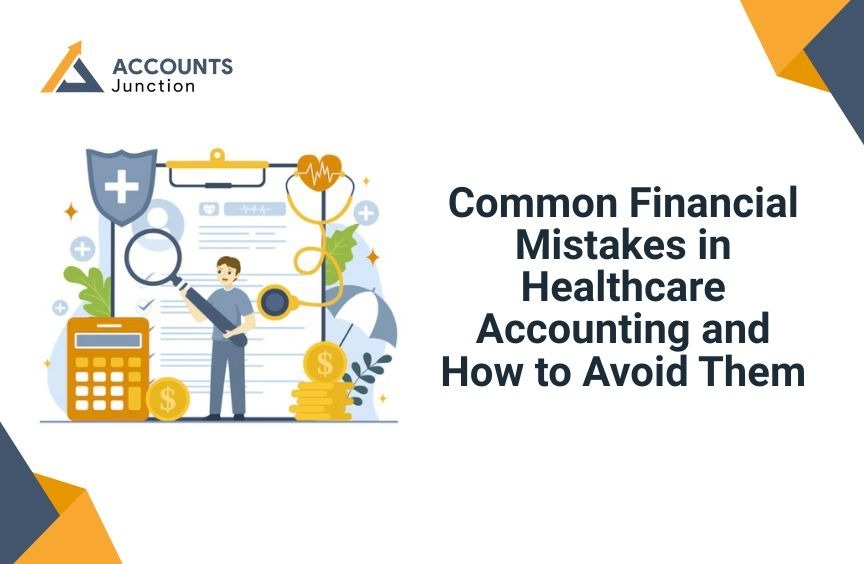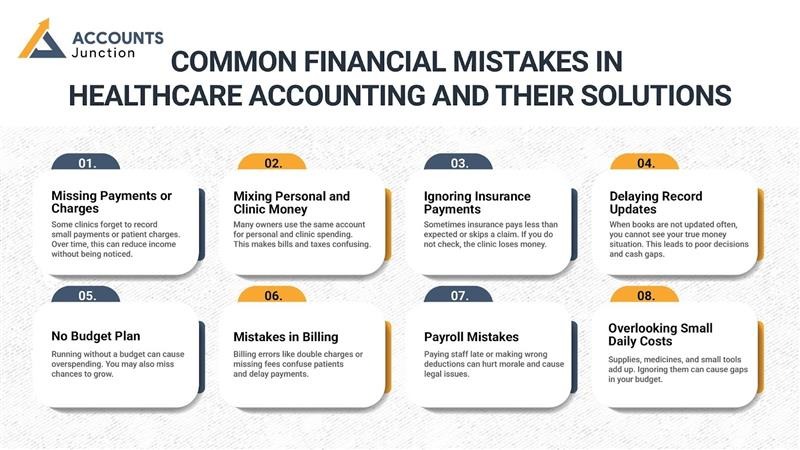
Common Financial Mistakes in Healthcare Accounting and How to Avoid Them
Running a healthcare practice is not an easy task. You care for patients every day, but you also need to care for your money. Healthcare accounting keeps your practice steady, helps it grow, and makes planning for the future much easier.
Yet, many doctors and clinic owners run into money problems that could have been avoided. Simple things like missed bills, late records, or unclear budgets can turn into big losses over time. These small slips can affect how your practice runs, from cash flow to tax filings.
In this blog, we’ll talk about the most common financial mistakes in healthcare accounting, why they happen, and how you can avoid them with a few smart steps.
Understanding the Basics of Healthcare Accounting
Healthcare accounting is different from regular accounting. It covers tracking patient payments, insurance claims, payroll, and compliance costs. Every part of your finances must meet healthcare rules and reporting needs.
Why Accuracy Matters in Healthcare Finances
A single accounting error can impact billing, claims, and tax filings. Errors may even lead to cash flow gaps or loss of trust. Using proper accounting for healthcare professionals' practices helps your clinic:
- Control costs
- Maintain compliance
- Track revenue correctly
- Support long-term growth
Common Financial Mistakes in Healthcare Accounting and Their Solutions
Let’s look at the mistakes many clinics and practices make and how to fix them before they grow into major issues.
1. Missing Payments or Charges
Some clinics forget to record small payments or patient charges. Over time, this can reduce income without being noticed.
Solution:
Use simple healthcare accounting software that tracks every payment. Make sure every charge is recorded as soon as it happens.
2. Mixing Personal and Clinic Money
Many owners use the same account for personal and clinic spending. This makes bills and taxes confusing.
Solution:
Keep separate accounts. Track all clinic spending clearly so you always know where your money goes.
3. Ignoring Insurance Payments
Sometimes insurance pays less than expected or skips a claim. If you do not check, the clinic loses money.
Solution:
Check every payment against your claim. Fix mismatches as soon as you see them.
4. Delaying Record Updates
When books are not updated often, you cannot see your true money situation. This leads to poor decisions and cash gaps.
Solution
Update your records weekly. This keeps your cash flow clear and planning easier.
5. No Budget Plan
Running without a budget can cause overspending. You may also miss chances to grow.
Solution:
Make a yearly budget. Track income and costs. Review it often to stay on track.
6. Mistakes in Billing
Billing errors like double charges or missing fees confuse patients and delay payments.
Solution:
Check invoices before sending. Use software that flags errors automatically.
7. Payroll Mistakes
Paying staff late or making wrong deductions can hurt morale and cause legal issues.
Solution:
Use simple payroll tools or a service. Check reports to catch errors early.
8. Overlooking Small Daily Costs
Supplies, medicines, and small tools add up. Ignoring them can cause gaps in your budget.
Solution:
Track every small expense. Even small payments matter to your cash flow.
Key Areas of Focus in Accounting for Healthcare Professionals
Healthcare accounting involves several areas that require close attention. Managing each one well helps clinics avoid financial stress and stay compliant.
|
Key Area |
Common Issue |
How to Handle It |
|
Payroll and Staff |
Wrong or late pay can upset staff and cause legal trouble |
Use payroll software or a service. Check pay records monthly. |
|
Equipment and Tools |
Tools and machines are costly. Repairs or replacements may strain cash |
Keep a list of all tools. Save each month for repairs or new tools. |
|
Taxes and Rules |
Missing forms or deadlines can lead to fines |
Keep all financial records up to date. Work with someone who knows clinic rules. |
|
Patient Billing |
Mistakes in bills or insurance claims can delay payments |
Check invoices before sending. Match payments with bills to avoid errors. |
|
Daily Supplies |
Small costs like medicines, lab tools, or office items add up |
Track all small costs. Update records often. |
|
Cash and Bank Records |
Mixing cash and bank accounts makes it hard to see finances |
Keep separate lists for cash and bank. Update daily. |
|
Late or Missing Payments |
Delayed patient or insurance payments hurt cash flow |
Follow up on unpaid bills. Use reminders or simple tracking systems. |
The Role of Technology in Modern Healthcare Accounting
Technology has changed how clinics handle money. Using the right digital tools can simplify Healthcare Accounting, reduce mistakes, and save time.
1. EHR Links
- Patient billing is linked directly to clinic records. Every charge is recorded correctly.
- Benefit: Saves time and stops billing mistakes.
2. Cloud Accounts
- Cloud systems let you see money records from any device at any time.
- Benefit: Teams can check updates and work together quickly.
3. Money Trends
- Tools can show trends in income, costs, and cash flow. They highlight areas to fix.
- Benefit: Helps make choices based on real numbers, not guesses.
4. Auto Billing
- Software can make bills and track payments on its own.
- Benefit: Reduces errors, speeds up payments, and saves staff time.
5. Track Expenses
- Tools log all spending, large or small.
- Benefit: Keeps budgets correct and stops small costs from piling up.
6. Staff Pay
- Payroll tools do pay, tax, and cuts.
- Benefit: Staff get paid on time. Stress drops.
7. Alerts
- Tools send notes for bills, taxes, or tool fixes.
- Benefit: Keeps cash in check. Stops risk.
8. Simple Reports
- Tools can make clear reports on income, costs, and profits.
- Benefit: Shows a full view of clinic money and helps plan better.
9. Link with Other Tools
- Some software links accounting with billing, scheduling, or stock lists.
- Benefit: Reduces repeated work and keeps all records correct.
Best Practices for Managing Clinic Money
Managing clinic money is more than logging payments and costs. You need a system to track cash, stop errors, and give a clear view of your money. Many clinics face cash shortfalls or missed payments because they skip simple steps.
- Keep all records up to date: Every payment from patients or any expense should be added as soon as it happens. Doing this helps spot errors early and avoid surprises. Using simple software or a tool can make this faster and more exact.
- Keep personal and clinic money separate: Mixing funds makes records unclear and taxes harder. Separate accounts show clearly what is clinic money and what is personal. This step alone can stop many common mistakes in healthcare accounting.
- Review claims and payments: Mistakes in patient or insurance payments can cost money. Match every payment with the record, and check any difference right away.
- Plan for daily costs and big items: Small items like meds or tools add up, and machines or furniture need repair or replacement. Saving for these costs keeps your clinic running smoothly.
By using these steps, clinic owners can avoid errors, keep records clear, and stay in control of money.
At Account Junction, we specialize in accounting for healthcare professionals who want to focus more on patient care and less on paperwork. Our team understands how complex healthcare finances can be, from handling claims to managing payroll.
We offer complete healthcare accounting solutions tailored for clinics, hospitals, and private practices. Our experts ensure accuracy in reports, compliance with tax laws, and real-time financial tracking. At Account Junction, we make accounting easy and transparent, so you can give your best to your patients while we take care of your books.
FAQs
1. What is Hospital Accounting?
It means tracking your clinic’s money. It shows what you earn, what you spend, and how healthy your cash flow is.
2. What is the goal of healthcare accounting?
To track and manage income, expenses, and patient-related costs accurately.
3. Why do healthcare professionals need specialized accounting?
Because healthcare has unique rules, billing systems, and tax needs.
4. Can I use regular accounting software for healthcare?
You can, but software made for healthcare is more accurate for billing and claims.
5. What happens if I mix personal and clinic expenses?
It can cause tax issues and make your books unclear.
6. How can outsourcing help healthcare professionals?
It saves time, reduces errors, and ensures all rules are met.
7. What services does Account Junction offer for healthcare?
We offer bookkeeping, tax filing, payroll, and full financial management for healthcare practices.
8. Are small daily costs important?
Yes. Ignoring small expenses can affect budgets and cash flow.
9. What should I do if payments are late?
Follow up fast and use reminders or simple tracking systems.
10. How can I avoid errors in billing?
Check every bill, match payments, and use software to flag mistakes.
11. Why is Clinic accounting important?
It keeps your clinic steady. With clear Accounting, you can plan, pay bills on time, and spot money issues early.
12. How is Healthcare accounting different from normal accounting?
It deals with patient bills, insurance, and health laws. Healthcare accounting needs more care and detail than a normal business setup.
13. How can I make Healthcare accounting easy?
Use simple tools that record bills and costs. Cloud apps or software can track income and show your money flow at any time.
14. Can I hire someone for Hospital Accounting?
Yes. Many clinics get help from experts. They handle all records, taxes, and pay so you can focus on your patients.

